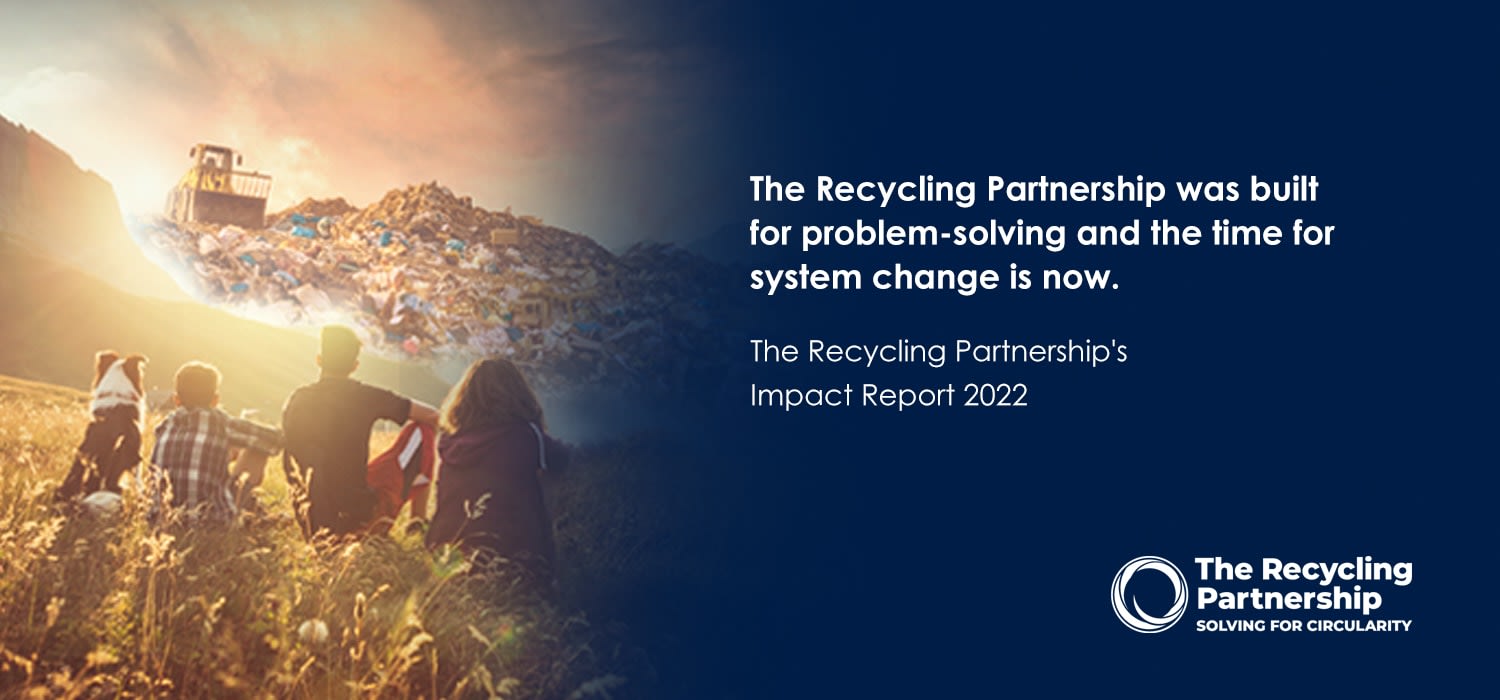
WASHINGTON, D.C. — The Recycling Partnership has released its Impact Report 2022: Complex Problems Require Bold, Integrated Solutions – highlighting solutions The Partnership has mobilized over the last eight years to collectively transform U.S. residential recycling and accelerate the circular packaging system of the future. Since 2014, The Partnership has reached over 100 million households, diverted more than 770 million incremental pounds of recyclables from landfill, inspected over 1.6 million carts, placed over 1.3 million carts in communities, supported over one-third of U.S. community recycling programs, and avoided 670,000 tons of CO2e.
The Partnership’s more recent impacts since 2019 include:
- Pioneering solutions for multifamily recycling
- Founding the Recycling Inclusion Fund to address the recycling equity gap
- Funding $23.6 million in catalyzed MRF (materials recovery facilities) investment and delivering $12 million value of new recyclables to MRFs.
- Increasing polypropylene curbside access by 7%
- Analyzing 20% of all U.S. plastic packaging (by weight) using Plastic IQ
- Creating the first-of-its-kind comprehensive national recycling database
- Establishing the Circular Economy Accelerator as the leader in smart recycling policy
- Spearheading work to strengthen recycling behavior in homes
Through the solutions described in the report The Partnership has the ability to build a system in which all households can recycle, people know what and how to recycle, MRFs are fully modernized, stakeholders work together to overcome material-specific obstacles to recycling, packaging is designed for, or on a path to, recyclability, and recycling has a sustainable public-private funding stream based on smart policy.
“With these solutions working in concert, we are building the system of the future. But we will not get there with piecemeal efforts that only chip away at the problem; we need bold systemic change,” said Keefe Harrison, CEO at The Recycling Partnership.
The Partnership has committed to supporting systemic change in its three-year plan calling for a transformation of the U.S. recycling system and accelerating the circular packaging system of the future. The Partnership will measure its future impact by recovery and collection of more than 1 billion pounds of new recyclables each year; improved consumer participation and trust in recycling and improved recyclability claims and labeling; creation of new scalable and systemic approaches to recyclability for currently hard-to-recycle items; initiation of effective and efficient policy that improves recycling system performance; and transformation of thousands of packages to recyclability and reduction of tens of millions of pounds of packaging through improved designs.
“We have a clear vision of what it will take to transform U.S. recycling and accelerate the circular packaging system of the future. We also have the people, data, and proven solutions to drive bold, measurable impact. All we need now is the commitment from all stakeholders to deliver full-scale system change,” said Jeff Meyers, Chief Strategy Officer at the Recycling Partnership.
To see the full 2022 Impact Report, visit recyclingpartnership.org/impact.
At The Recycling Partnership, we are solving for circularity. We mobilize people, data, and solutions across the value chain to unlock the environmental and economic benefits of recycling and a circular economy. We work on the ground with thousands of communities to transform underperforming recycling programs; we partner with companies to achieve packaging circularity, increase access to recycled materials, and meet sustainability commitments; and we work with government to develop policy solutions to address the systemic needs of our residential recycling system and advance a circular economy. We foster public-private partnerships and drive positive change at every step of the recycling and circularity process. Since 2014, we have diverted 770 million pounds of new recyclables from landfills, saved 968 million gallons of water, avoided more than 670,000 metric tons of greenhouse gases, and driven significant reductions in targeted contamination rates. Learn more at recyclingpartnership.org.
